THE SON AND THE HOLY SPIRIT ARE THE 2 ARMS OF THE FATHER!
|
The SON and the HOLY SPIRIT are the 2 arms of the HOLY FATHER . . . or JEHOVAH #1.
From 381 until 1014, the Latins and the Greeks acknowledged one common creed called the Nicene-Constantinopolitan Creed.
Both creeds were practically identical until the Latins added a phrase to the creed called the Filioque. Filioque is a Latin phrase meaning and the Son.
Here is the original wording of the creed:
And in the Holy Spirit, the Lord, the Giver of Life, Who proceedeth from the Father, Who with the Father and the Son together is worshiped and glorified.
Here is the creed with the Latin addition:
We believe in the Holy Spirit, the Lord, the giver of life, who proceeds from the Father and the Son. With the Father and the Son he is worshipped and glorified.
The heretical phrase "AND THE SON" was first added by the Latin Third Council of Toledo, Spain, in 589 AD. That erroneous addition was not officially adopted by the Papacy until the the year 1014—over 600 years after the Council of Constantinople.
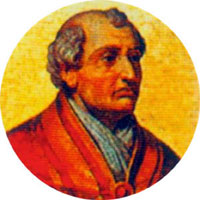 Pope Benedict VIII. Pope from 1012 to 1024. |
|
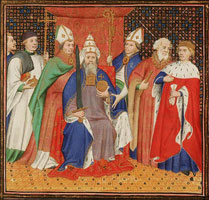 Fake "Holy Roman" Emperor Henry II. Ruled from 1014 to 1024. |
The addition of the heretical formula was a power play by the Papacy:
This mutual agreement between Rome and Constantinople, to say it once more, was maintained until the eleventh century, when, during the coronation of the German emperor Henry II (1014), the fateful formula was finally adopted in Rome as well. As a result of this adoption, the altered creed became standard throughout the West. Inevitably, the scope of the debate widened as well. Before long, Rome was justifying the alteration by its own doctrinal authority. As papal apologists were to argue, it was sufficient that the Roman pontiff had declared it dogma; by virtue of his Petrine power, he was not subject to conciliar judgment. (Papadakis, The Christian East and the Rise of the Papacy, pp. 228-229).
It was never accepted by the Greeks because Christ stated plainly that the Spirit proceeds from the Father . . . and not from the Son:
Those Scriptures make it very, very plain that the Son and the Holy Spirit are the 2 hands of JEHOVAH.But when the Comforter is come, whom I will send unto you from the Father, even the Spirit of truth, which proceedeth from the Father, he shall testify of me (St. John 15:26).
And I will pray the Father, and he shall give you another Comforter, that he may abide with you for ever (St. John 14:16).
But the Comforter, which is the Holy Spirit, whom the Father will send in my name, he shall teach you all things, and bring all things to your remembrance, whatsoever I have said unto you (St. John 14:26).
Augustine of Hippo Regius was the originator of the creedal addition!
Augustine of Hippo Regius in North Africa was the most powerful and influential teacher of the Latin church. Most of the false doctrines that emerged from that church can be traced right back to him.
Some of these false doctrines include:
Original
sin |
Infant
baptism |
Purgatory |
Clerical
celibacy |
Predestination |
Augustine was also the author the "unholy Koran" that teaches that the Mohammed was the "Holy Spirit" or Comforter!
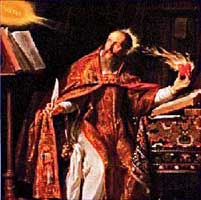 Augustine of Hippo Regius (354–430). |
|
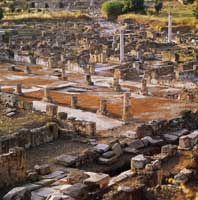 Ruins of Hippo Regius in North Africa. |
Augustine wrote a treatise entitled On The Trinity in 15 books. In those books he planted the seed for the later development of the addition of the Filioque clause to the creed:
The Greeks could never accept such new . . . and to their eyes blasphemous doctrine.For as to be born, in respect to the Son, means to be from the Father; so to be sent, in respect to the Son, means to be known to be from the Father. And as to be the gift of God in respect to the Holy Spirit, means to proceed from the Father; so to be sent, is to be known to proceed from the Father. Neither can we say that the Holy Spirit does not also proceed from the Son, for the same Spirit is not without reason said to be the Spirit both of the Father and of the Son. Nor do I see what else He intended to signify, when He breathed on the face of the disciples, and said, Receive the Holy Spirit. For that bodily breathing, proceeding from the body with the feeling of bodily touching, was not the substance of the Holy Spirit, but a declaration by a fitting sign, that the Holy Spirit proceeds not only from the Father, but also from the Son. (Augustine, On the Trinity, book IV, ch. 20).
Saint Photius the Great refuted the Filioque
Obviously, the members of the Orthodox Church were horrified at this unauthorized change to the centuries old Nicene-Constantinopolitan Creed.
One of the foremost opponents of this innovation was Saint Photius, Patriarch of Constantinople. He wrote a brilliant thesis refuting Augustine and his Filioque.
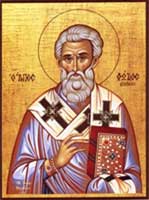
Saint Photius
the Great (820–893). Patriarch from 858 to 886. |
|
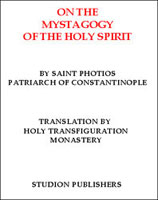 Book cover by Saint Photius. |
Here is a small sample of his writings against the creedal addition:
Moreover, if the Son is begotten of the Father, and if the Spirit proceeds from the Father and the Son, it would not be an innovation in respect of the Spirit if another should proceed from Him. In accord with their mad opinion, therefore, not three, but four hypostases could be inferred, or rather an infinitude, because the fourth could produce another, and that one yet another, until they would surpass even pagan polytheism.
But it is possible to utter this sort of argument against them. If the Son received all that He possesses from the Father, thence also would He gain the faculty of being the cause of the procession of the Spirit. But whence this favoritism in which the Son is distinguished as a cause of the procession of the Spirit, while the Spirit is deprived of equal prerogatives? For the Spirit has equality of honor, since He came forth with equal rank and honor from the same essence.
Is not the Spirit divided into two by them? The one part proceeds from the Father, the true and first cause (for He is uncaused), and the other part from a secondary, derived cause (for the Son is caused). Thus this heresy does not only flaunt the Spirit's difference and distinction in rank, relation, and cause, but it dares to debase our religion from a Trinity to a Quaternity. Indeed, no effort is neglected to malign everything in the transcendently good Trinity and Creator of all! (Saint Photius, On the Mystagogy of the Holy Spirit, p. 86).
Many other great Greek theologians refuted the Filioque, but their writings were destroyed when the Crusaders sacked Constantinople.
Vital Link
The Filioque from the Orthodox Wiki
References
Papadakis, Aristeides. The Christian East and the Rise of the Papacy. St. Vladimir's Seminary Press, Crestwood, New York, 1994.
Saint Photios. On the Mystagogy of the Holy Spirit. Studion Publishers, New York, 1985.
Copyright © 2020 by Patrick Scrivener